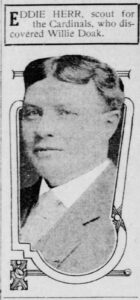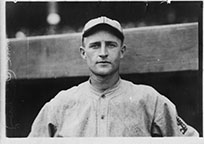- Doak Obtained By Scout Eddie Herr For A Mere $500
- The Giants, or any other major league club, would willingly pay $25,000 for Doak today.
August 22, 1914 Age 23
By Harry F. Pierce The St Louis Star and Times
 Perseverance wins. Don’t think for a minute that Perseverance is name of a race horse, for this is a not a racehorse story.
Perseverance wins. Don’t think for a minute that Perseverance is name of a race horse, for this is a not a racehorse story.
It is an account of how a St. Louisan named Eddie Herr jumped from the obscurity of managing a Class D minor league club to the distinction of being recognized as one of the country’s best baseball scouts. During the early part of 1913 Eddie Herr was managing the Hannibal team of the Illinois-Missouri League.
In June of that year he learned that the St. Louis National League club was in quest of another capable scout to assist the veteran Bob Connery in unearthing promising material from the minor organizations. Herr applied for the job and in July was notified of his appointment. Early in August he began a tour of the bush league circuit. His first stop was Zanesville, Ohio, in the Interstate League, where he journeyed to look at a catcher named Charlie Glenn, who had been recommended to the St. Louis club by the owners of the Akron team of the Interstate league, with which Glenn was playing.
During his long career as a minor league manager, Herr made the acquaintance of several major league scouts who had visited him at one time or another in their rounds.
THE DEBUT OF EDDIE HERR.
This acquaintanceship stood Herr in good stead the very first day he began his duties as a major league scout. The Akron team, with which Glenn was playing, was engaged in a series with the Zanesville team at Zanesville. Ohio. Herr recognized three major league scouts he saw in the grandstand.
Walking up to them he informed them of his appointment as a. Cardinal scout.
“Come to see Bill Doak, too?” queried one of the scouts. “Yep”, replied Herr, “just dropped in to look him over. In this way Herr was apprised of the mission of his rivals in the Ohio city and did not let them know the real purpose of his visit.
The Akron team was in bad straits and the manager, knowing that scouts were in the park, nominated Bill Doak to twirl that day’s game. Doak as everyone knows, is a spitball hurler.
The Zanesville ball yard had a skinned diamond, and as skinned diamonds have a tendency to roughen the ball and render it less subservient to the mastery of a spitball hurler, Bill Doak put up a very poor exhibition of the twirling art on that day. At the end of the game Herr’s rivals were unanimous in their condemnation of the Akron club owners for trying to pan off a rank spitballer on them. Herr agreed with them in their opinion that Doak was not a very promising major league prospect.
FOXY CARDINAL SCOUT.
He did that as a sham, so that they would not delay their departure for other regions. That night Herr boarded an outbound train and rode about twenty miles out of Zanesville. He got off the train at a little tank-town and remained there overnight, knowing the other sleuths intended to depart from Zanesville the following morning. The next day he returned to Zanesville to watch Glenn in action again.
The real purpose of Herr’s return was to get another glimpse of Doak. Something seemed to convince him that Doak was a very brilliant prospect. He trailed the Akron team around the circuit and saw Doak pitch several games, but the Interstate league diamonds were for the most part skinned diamonds, and Herr did not see Doak at his best until they returned to Akron.
PERSEVERANCE OF HERR.
Herr’s perseverance astounded the Akron club owners. They thought he was after Charlie Glenn alone and they were determined that Glenn should bring a good price. But Herr’s purpose was to see Doak perform on a grassy diamond, where a spitballer always shows at his best. His perseverance was rewarded the very first day Doak pitched on the home diamond. The Ohio spitballer looked like the greatest hurler in the business, on that grassy plot.
Herr knew he had a find, but did not want to tip his mitt before he landed the young phenom. After the game that afternoon Herr went to the Akron club owners and asked what they would like for Glenn. “Five thousand dollars,” was the reply. “Well your league’s going to bust up in a couple days.” said Herr, “so I guess I better wait and get him for nothing.” This announcement startled the Akron men. Herr had some inside information. The league was on its last legs.
Finally the club owners came around and asked Herr what he would give for Glenn. “One thousand dollars.” Herr replied. “Better take Bill Doak and Glenn together for $1,500.” said the Akron moguls, “you can farm Doak out for development and he will be a good pitcher some day.” “All right,” said the crafty Mr. Herr, “I’m always willing to help a good cause along, here’s your check, gimme their contracts.”
GLENN’S HARD LUCK.
Four days later the Interstate League went to smash. In the last game played, Charlie Glenn broke an ankle. He picked up so much surplus weight while sitting around waiting for the foot to heal, that he looked like a big cheese at the training camp last spring. The Cardinals sold him to St. Paul of the American Association. Immediately after the Interstate League disbanded Doak reported to the Cardinals and in his first appearance stood the New York Giants on their heads.
One look at Doak in action and Manager McGraw offered Miller Huggins $5,000, and two New York players for Doak.
Doak hurled several games for the Cards last fall and was beaten by one run in most of them. Instead of farming him out, the Cardinals planted him. This year he took root and flourished. Today, he is the sensation of the National League and bids fair to become a world’s series hero. To date he has won fifteen and lost but five games. He ranks second to the top in the National League pitching average, and indications are that at his present rate of progress he will top the league ere the month of August is over.
Bill Doak deserves every bit of the praise the baseball experts are now heaping upon him. Eddie Herr deserves a life time job with the Cardinals and has President Britton’s assurance that the job is his just a long as he wants to retain it. The Giants, or any other major league club, would willingly pay $25,000 for Doak today.
Perseverance wins.
